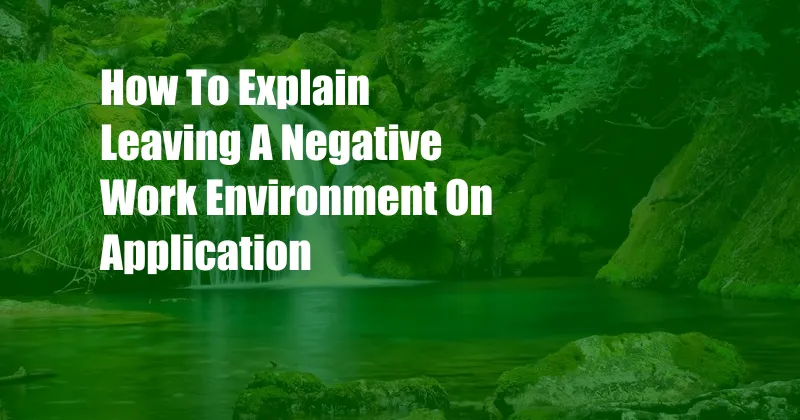
How to Delicately Explain Leaving a Negative Work Environment on a Job Application
Navigating the job market can be challenging, especially when you’ve endured a toxic or negative work environment. Explaining your departure from such a workplace on a job application requires a delicate balance between honesty and professionalism. This article will guide you through the process, providing tips and expert advice to help you navigate this sensitive topic effectively.
Understanding Your Situation
Before you start crafting your job application, it’s essential to understand the reasons behind your departure from the negative work environment. Identify the specific factors that made the workplace toxic and how they impacted your work life. This will help you articulate your experience clearly and concisely in your application.
Defining a Negative Work Environment
A negative work environment is characterized by a combination of factors that create a harmful or unproductive atmosphere. These factors can include:
- Toxic relationships with colleagues or supervisors
- Lack of respect or appreciation
- Unrealistic workload or deadlines
- Lack of opportunity for growth or advancement
- Discrimination or harassment
Impact of a Negative Work Environment
Working in a negative environment can have significant consequences for your well-being and career. It can lead to:
- Stress, anxiety, and depression
- Reduced productivity and job performance
- Increased risk of burnout
- Damage to your reputation and professional relationships
Crafting Your Explanation
When addressing your departure from a negative work environment on a job application, honesty is crucial, but so is professionalism. Here’s how to craft a balanced and informative explanation:
1. Be Specific and Factual
State the reason for your departure clearly and objectively. Avoid using vague or emotional language. Instead, focus on specific behaviors or actions that created the negative environment. For example, you might say: “I left my previous position due to a lack of support and mentorship from my supervisor.”
2. Use Professional Language
Even when describing a negative situation, it’s important to maintain a professional tone. Avoid using negative or accusatory language. Instead, use diplomatic terms that convey the impact of the negative environment on you and your work.
3. Emphasize Your Positive Attributes
While it’s necessary to explain your reasons for leaving, don’t dwell on the negative aspects of the experience. Instead, focus on how your skills and experience helped you cope with the challenges and what you learned from the situation.
4. Highlight Your Growth and Resilience
Explain how the negative experience has made you a stronger and more resilient professional. Emphasize the lessons you’ve learned and how they have prepared you for future challenges.
5. Seek Expert Advice If Needed
If you’re struggling to articulate your experience or need guidance on the best way to address it, consider seeking advice from a career counselor, mentor, or trusted professional. They can provide an objective perspective and help you craft a clear and effective explanation.
Tips and Expert Advice
Here are some additional tips and expert advice to help you navigate this sensitive topic successfully:
- Be prepared to discuss your experience in an interview. Practice your answer to the question “Why did you leave your previous job?” and ensure that you can articulate your explanation clearly and professionally.
- Consider using a cover letter to provide additional context. Your cover letter can be a valuable space to expand on your reasons for leaving and highlight the skills and experience you gained during your time in the negative work environment.
- Don’t badmouth your previous employer. Even though you may have had a negative experience, it’s important to maintain a professional demeanor and avoid making negative comments about your former employer.
- Focus on the future. Emphasize your enthusiasm for the new opportunity and how your skills and experience align with the requirements of the position you’re applying for.
Frequently Asked Questions
Here are some frequently asked questions about explaining a negative work environment on a job application:
- Q: Should I mention the negative work environment in my resume?
A: No, it’s not typically advisable to include this information on your resume unless it’s directly relevant to the position you’re applying for.
- Q: What if I’m worried about being blacklisted?
A: If you’re concerned about being blacklisted, you can consider seeking legal advice or contacting your former colleagues to see if they’re willing to provide a reference for you.
- Q: How can I tell if I’m in a negative work environment?
A: Some signs of a negative work environment include high turnover, low morale, and a lack of respect or appreciation.
Conclusion
Explaining your departure from a negative work environment on a job application requires a well-crafted and professional approach. By being honest and specific, while maintaining a positive and forward-looking attitude, you can navigate this sensitive topic successfully. Remember, your resilience and ability to learn from challenging experiences will ultimately make you a stronger and more desirable candidate.
Did you find this article helpful? Share your thoughts and experiences with leaving a negative work environment in the comments section below.